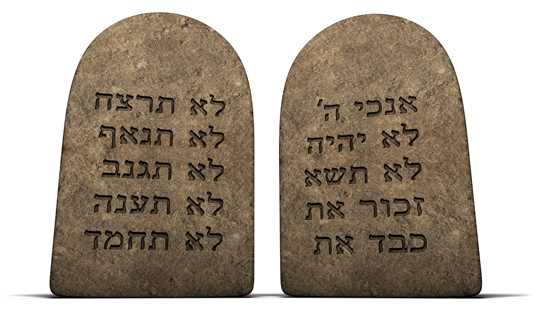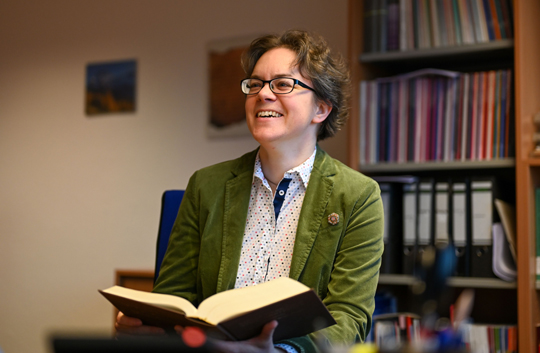Not a sin checklist
Freiburg, Dec 15, 2020
The Ten Commandments is one of the most well-known passages from the Bible. Just think of “Thou shalt have no other gods before me,” “Thou shalt not covet thy neighbor’s house,” or “Thou shalt not commit adultery”. Although the commandments are well-known, the core idea behind them is often misunderstood, says theologian Dr. Carolin Neuber, a teacher and researcher at the Department of Literature and Exegesis of the Old Testament at the University of Freiburg. She has written a chapter for the recently published anthology “Bibel falsch verstanden” (The Bible Misunderstood) in which she explains why the Ten Commandments are not simply a list of things we are not supposed to do. Thomas Goebel talked to her about her approach.
 Two stone tablets with two different focuses: The first with commandments concerning our relationship to God, the second with commandments concerning our relationship to one another. Photo: James Steidl/stock.adobe.com
Two stone tablets with two different focuses: The first with commandments concerning our relationship to God, the second with commandments concerning our relationship to one another. Photo: James Steidl/stock.adobe.com
Dr. Neuber, you say that the Ten Commandments are often misunderstood as a kind of sin checklist. But isn’t that what they are?
Carolin Neuber: No, the Ten Commandments are not at all about sins, and they’re definitely not a kind of checklist. Instead, they are guidelines for how we should live our lives. If you look more closely at the context in which the Ten Commandments appear in the Bible, you will get a better perspective.
What perspective do you mean?
The first sentence is about God’s self-image. He says, “I am the LORD your God, who brought you out of the land of Egypt, out of the house of bondage.” God’s liberation of the Israelites from slavery in Egypt does not end with them being stuck in the desert. The perspective is that they are on their way to live in the Promised Land. The Ten Commandments are thus a necessary answer to the question ‘What are we going to do with our newly won freedom?’
What kind of guidelines do the Ten Commandments provide when it comes to living in freedom?
There are two sets of guidelines, if you will. We have the things we should do concerning our relationship to God, and the things we should do regarding our relationships to our fellow human beings. These guidelines are often seen as being divided between the two stone tablets that Moses is said to have received. However, I believe it is too strong to say there is a division. Throughout the Bible, the theological and social commandments are closely interconnected. Without a relationship to God, we cannot live in harmony with our fellow human beings, and our relationship to God is no use if we do not get along with each other. Liberation from slavery means the freedom to serve God, but it also means respecting the rights of others, such as the right to live and the right to own property. God wants the Israelites to remember that they were released from slavery. If we look at the larger context of the Ten Commandments – the Books of Exodus and Deuteronomy – we understand that the commandments were primarily meant to protect the weak – those living on the margins of society.
Are the Ten Commandments also intended to warn us about the right of the strongest?
The Bible sees people for what they are. This especially becomes clear when you read how Cain kills Abel. Humans apparently need “instructions” to protect the gift of freedom and to avoid returning to the old system of oppressing one another. The word Tora can therefore be interpreted as meaning “instruction.” The Book of Deuteronomy also makes it clear that the Ten Commandments are about protecting the weak, the so-called personae miserae. In the Old Testament, these are the widows, the orphans, the poor and needy, and people from other lands. The Old Testament as a whole has a sisterly/brotherly, and hence very social, approach to society. In Deuteronomy, there are many other rules as well – for example, about not charging interest, or forgiving debtors after seven years.
In the Ten Commandments, God says, “For I the LORD your God am a jealous God, visiting the iniquity of the fathers upon the children to the third and the fourth generation of those who hate me.” How does this fit with the ideal of the peaceful, sisterly and brotherly society that you describe?
It is a question of how you define “jealous.” It most certainly does not mean that God is an angry God wreaking havoc and destruction as is sometimes meant when God is referred to as the “Old Testament God.” Incidentally, the Nazis also used this image of God with anti-Semitic intentions. It would be better to describe God as more of an enthusiastic, passionate God: a God who is passionate about justice and who gets angry – not furious and wrathful – when someone does not respect the fact that the weak deserve protection, for example. Then he takes action. And don’t forget what comes after this verse: “But showing steadfast love to thousands of those who love me and keep my commandments.” This positive side of the jealous God is often left out.
 The core idea behind the Ten Commandments is still relevant in today’s society. As Dr. Carolin Neuber says, “How do we – by which I mean all of us – protect the freedom we have been given without hurting those who are weak?” Photo: Patrick Siegert
The core idea behind the Ten Commandments is still relevant in today’s society. As Dr. Carolin Neuber says, “How do we – by which I mean all of us – protect the freedom we have been given without hurting those who are weak?” Photo: Patrick Siegert
What about the third and fourth generation?
This refers to the entire extended family who may be on the wrong moral track and have passed this down to younger generations. The “visiting upon” in this verse does not necessarily mean punishment. God oversees whether the third and fourth generation have followed in the footsteps of their parents and grandparents and are also guilty of unjust conduct – he only punishes them if this is the case. In the Old Testament, the idea of punishment is also not based on a vengeful God, but on the view that if you behave well, you will do well, and if you behave badly, you will do poorly. Here, God is holding up the ancient Middle Eastern code that says all actions have consequences. I believe that this idea is similar to the idea in modern sociology that we are all connected – that our actions have consequences not only for our own lives, but also for the lives of those around us. This applies to many things, not least the coronavirus.
Indeed, the virus does come to mind. Some people might say that the measures being taken to reduce the spread of the coronavirus are commandments of sorts, and then there is all this talk about protecting the weak…
You’re right. We are trying to protect people who are at risk by wearing masks, for example, because we can’t do things like hermetically seal off retirement homes. However, this does not mean that we should just mindlessly follow rules. We should always take others into account and consider who needs protection in each situation. There is a great example of this behavior in the Book of Deuteronomy. Because houses had flat roofs back then, there is the commandment “When you build a new house, you shall make a parapet for your roof, that you may not bring the guilt of blood upon your house, if any one fall from it.”
You mentioned that the Ten Commandments relate to the Israelites being freed from slavery in Egypt. Do these old commandments need to be reformulated to make them more relevant for today’s world?
That depends on what you mean by that. You don’t have to change a commandment like “You shall not kill.” What we can do, however, is to remember and understand the context in which the Ten Commandments were written – that they are about how we can live well. Even people who are not Christian can perhaps also reflect on this. How do we – by which I mean all of us – protect the freedom we have been given without hurting those who are weak? If you regard this as the core message of the Ten Commandments, then you have already understood their relevance for today’s world.


